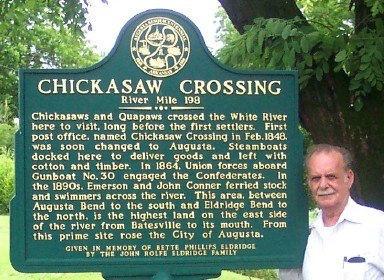Chickasaw Crossing---Now Augusta, Arkansas
With the coming celebration of Augusta Days that will be held this weekend, I thought it would be appropriate to write some early history of the town and its early settlers. This is what I have found.
The town is called Augusta, but once and for many years it was known far and wide as Chickasaw Crossing, even when Arkansas was just a part of that vast expanse of land which later was included in the Louisiana Purchase.
Chickasaw Crossing on White River was given its name far back in the shadowy past. Before Columbus, Cabot De Leon or De Soto ever touched ship on American shores, this ground now occupied by Augusta, high and safe from the periodic overflow, was used by Chickasaw and other Indian tribes to hold war councils or smoked peace pipes. With little effort their women grew corn in the black loam. Mounds and fields yield a varied collection of arrowheads, bits of clay pots and small containers of different periods, sure proof of a long-established Indian settlement. Here was peace and plenty, an ideal spot alike for Indian or pioneer, so here one of the earliest roads was opened. The river furnished the water highway, and a natural ford crossing for land travel.
This trail became a famous wilderness road, used by Indians, early French and Spanish explorers and later by pioneers who were agreeably surprised and immeasurably aided in their travels by this ancient, well-defined route through Chickasaw Crossing.
There is a legend of early times that runs thus: The gallant Chevalier de la Teague, a young French nobleman, weary of a corrupt court and fired by the love of adventure, joined La Salle in his journey to America and accompanied him on one of his trips down the Mississippi. When La Salle stopped at Chickasaw Crossing for a friendly visit with the Indian tribes, the young Chevalier saw the daughter of an Indian chieftain and was so fascinated by her fresh beauty and shy grace that he stayed behind to claim her for his bride, preferring life in the primitive forest to the ease and luxury of the tainted court he had fled. North of Augusta is Teague's mound, supposedly the burial place of the Chevalier and his princess.
Another popular story tells of the company of palefaces who had passed through bearing their stricken leader upon a litter. This party, no doubt, was that of De Soto and his followers.
Another story tells of search parties sent out from Arkansas Post, seeking the lost leader La Salle, whose adventurous spirit had led him on the ill-fated expedition into the Southwest.
Later when pioneers came West in search of adventure, new land and elbow room, Chickasaw Crossing became the focal point for travel and trade. The crossing with its tree-crowned banks presented such an enchanting view that all who saw it wished to land, and having landed, many determined to stay. The bays and bayous offered ideal fishing places and the virgin soil beyond the east bank proved a fertile place for cotton and corn.
At low water mark the river ford reaches a sandbar that extends far into the river. The east bank is an ideal harbor for large steamboats and it still is the trade center for thousands of fertile acres that have always remained above flood water.
In 1820, when the first white settlement was made, trappers and hunters made friendly pacts with their Indian hosts, and secured hunting rights. They used the river for the sure and swift transportation of bales of fur and livestock. In the river bottoms were succulent cane brakes which furnished prime food for horses and cattle. The high land furnished ample acreage for pasture and grain when the river covered the lowlands.
Rolla Gray, first recorded settler, came in 1820. He homesteaded large tracts on the site of Augusta and points south. In a few years he had shipped by boat to New Orleans over 500 head of horses and cattle. He was the first of many to make large profits in stock trading, the earliest profitable enterprise of this section.
During later pioneer days, the Rev. Thomas Gregory, ancestor of the Rev. Ben C. Few of Freeman, visited in the home of the early settler, Rolla Gray.
By 1830, White River had become the main channel of travel for an increasing territory. Large steamers from New Orleans, Memphis and St. Louis came to Chickasaw Crossing. They transferred freight and passengers to smaller steamers bound for Jacksonville, Batesville, and other points.
Every boat brought pioneers, their slaves, livestock and household possessions. Others came overland in covered wagons drawn by ox teams. They also brought slaves, furniture and often valuable household goods. Many citizens have cherished heirlooms, mementoes of those exciting days.
In 1836 - the year Arkansas became a state - two families, the Millers and the Roddys, came to Chickasaw Crossing, and pooling the labor of their slaves, cleared large tracts of land near Augusta. Both men were veterans of the Mexican and Indian wars. Descendants of both families owned land opened up by their pioneer forefathers who, coming in search of adventure, won prosperity and security. Lee Miller, great-grandson of the pioneer, Alex Miller, was named master farmer of Woodruff County in later years.
In 1844 Thomas Hough, a wealthy Quaker from Maryland, chose Chickasaw Crossing as a likely spot in which to invest capital and energy. He first opened a supply store in a log building, but later conducted business in a frame structure. About 1859 he built a brick residence on the site where the courthouse now stands. Because of his large investments and his progressive methods, Chickasaw Crossing became more than a river port. In 1854 he obtained a charter for the town and named it for his niece, Augusta.
In 1846, William Polite, another man of means from Maryland, moved to Chickasaw Crossing. He owned all of the land on the upper east bank of the river. Mr. Polite had no family but he made a home for his widowed sister, Mrs. Annie Shuh, and her five children. Some of Mrs. Shuh's descendants resided here on property inherited from Mr. Polite.
Prosperity, growth and enlarged prospects for farming and industry became an assured fact for Chickasaw Crossing. Brick stores and warehouses for steam boat freight were built along the river front. Brick and frame houses replaced the earlier log buildings. During the Civil War most of the houses were destroyed by fire. Every boat brought passengers with gold in their pockets and broadcloth on their persons and others with motley clothing, small bundles of necessities, a gun and the inevitable hound dog. Building materials, foodstuffs and barrels of whiskey were added to other commodities loaded from barge to shore. In 1848 the citizens of Chickasaw Crossing decided that they needed a post office. A meeting was held in the rear of Mr. Polite's store, and he was chosen to apply to the federal government for a charter, which was granted and was sent by special messenger to Chickasaw Crossing. The document, yellowed by age, on parchment and quite legible, though not clear in a photograph, reads as follows:
GAVE JOHNSON Post Master General of the United States of AmericaThus only 13 years after Arkansas became a state, Chickasaw Crossing had a post office. Mr. Polite operated the office in connection with a general supply store which he owned in partnership with Mr. Hough. This store, a long frame building, later destroyed by fire, was situated to the west of Mrs. Lundy Sinclair's residence. The charter above was owned by a great-niece of Mr. Polite, Mrs. Edward Woodson.
To all who shall see these present, greeting:
"Whereas on the 21st day of February, 1848, William Polite was appointed Post Master at Chickasaw Crossing, in the County of Jackson, State of Arkansas; and whereas he did on the 17th day of May, 1848, execute a bond, and has taken the oath of office, as required by law."
"Now know ye, that confiding in the integrity, ability and punctuality of the said William Polite, I do commission him as Post Master, authorized to execute the duties of that office at Chickasaw Crossing aforesaid according to the Laws of the United States and the regulation of the Post Office Department; to hold the said office of Post Master, with all the powers, privileges, and moluments to the same belonging, during the please of the Post Master General of the United States."
"In Testimony whereof, I have hereunto set my hand and crossed the Seal of the Post office Department to the flexed at Washington City, the 1st day of July in the year of our Lord one thousand eight hundred and forty-eight and of the Independence of the United States the seventy-second."

